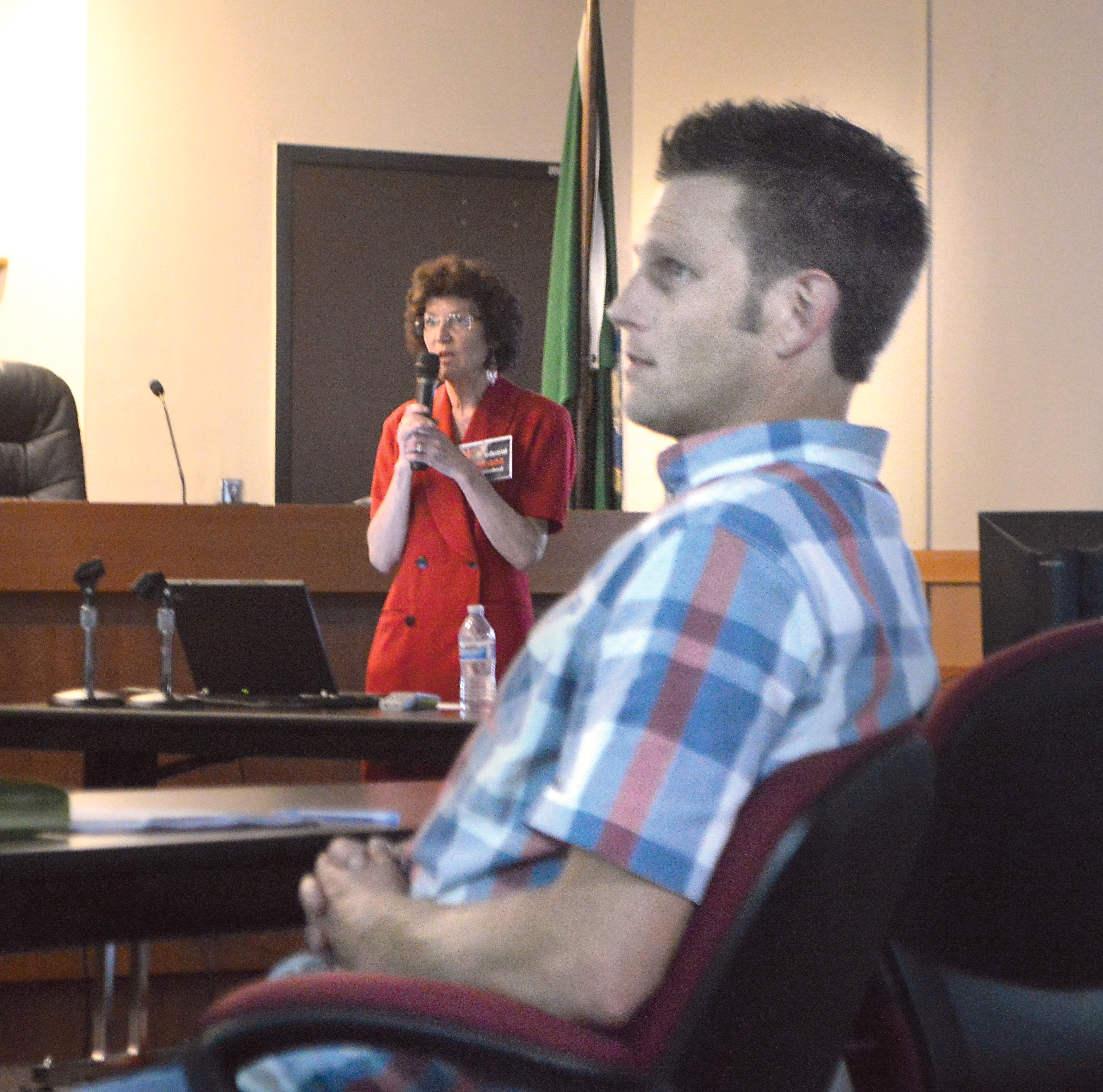PORT ANGELES –– Clallam County Hearings Examiner Mark Nichols has until Aug. 27 to decide whether county zoning law permits a marijuana grower in a rural area.
During four hours of testimony Wednesday, potential neighbors of brothers Travis and Ryan Palmer said they don’t want a large marijuana facility in their backyards.
The Palmers are seeking a conditional-use permit for construction of a facility to grow newly legal recreational marijuana on land zoned low-density rural on Cassidy Road.
Neighbors said zoning laws have failed to protect their home values during a hearing on the permit request at the county courthouse.
“Today, we are defending our way of life,” said Kathryn McCready, who lives near Palmer’s proposed facility in the Lost Mountain area west of Sequim.
“No reasonable person can look at this and say it fits their neighborhood character.”
A standing-room-only crowd of more than 100 pushed fire capacity in the commissioners’ meeting room and overflowed into the emergency operations center in the courthouse basement, where another two dozen people watched the hearing on a televised feed.
The Palmers want to build a tier 2 marijuana operation that would produce 5,500 square feet of marijuana.
The plants would be inside 8,496 square feet of buildings — a steel building and two greenhouses — on 6 acres.
Senior county planner Greg Ballard recommended Nichols deny the permit, saying it could have adverse impacts on water resources and rural aesthetic; produce light pollution, odors and dust; and pose security issues.
Other marijuana growers told Nichols, who is also a candidate for county prosecuting attorney in this fall’s election, that the county recommended the permit be rejected only after hearing an outcry from the Palmers’ neighbors.
“I’m concerned this is becoming more an issue of public opinion than it is fact,” said Tim Humiston, who represents Canna Organix LLC, a potential marijuana grower in Carlsborg.
In his testimony before Nichols, Travis Palmer said the low-density rural zoning of the property was a reason he and his brother purchased the Cassidy Road site.
Neither the Palmers nor Humiston have been licensed by the state Liquor Control Board, which regulates the recreational marijuana market legalized by the November 2012-approved Initiative 502.
Clallam County voters gave the initiative 55 percent approval.
“The reason I settled on this one is because I was told zoning wouldn’t be an issue,” Palmer said.
“When I first got here, I got that exact same advice,” Humiston said.
County officials initially considered marijuana growing an agricultural activity, allowed in nearly every zone.
In April, the county determined marijuana was not agriculture and required conditional-use permits to site grow operations in non-industrial zones.
Ballard initially ruled the Palmers’ operation would not have a significant negative environmental impact but withdrew that ruling in June.
In July, Ballard ruled the project would have impacts that could be mitigated.
“Public concern raised, raised, raised, and they decided to review the application and came back with the mitigated” determination of non-significance, Humiston said.
He said the county’s applications of regulations has been “inconsistent.”
Michael Libera was granted a permit July 9 to site his Mother Earth Farms marijuana grow on land zoned low-density rural on Power Plant Road west of Port Angeles.
“It seems to me it’s incumbent on you, Mr. Nichols, to look at this as a larger perspective,” said Steffan Sherman, who said adding this permit to those already issued would lead to “policy creep.”
“You have a deeper question to answer at this time.”
Travis Palmer said he would be willing to change his plan to make the facility more attractive to neighbors, including changes to the greenhouses and fencing design.
He also offered to move the buildings to a less visible part of the property.
“I’m flexible on things,” Palmer said.
Sound, smell and light from the facility would all have to be controlled for the health of his plants, he said.
Palmer compared his planned facility to local lavender and produce farms that currently use greenhouses.
“I don’t really think the county has done a great job in differentiating the differences of cannabis and lavender,” he said.
But the dozens of residents of the neighborhood surrounding Palmer’s site said marijuana growing facilities are not lavender farms and should be built in industrial areas only.
“Dry it, smoke it, do whatever you want to it — all lavender is going to do is smell good,” Brad Bucher said.
“Marijuana is designed to get people high. That’s why the liquor board has all these security concerns around it.”
“It is a narcotic, but it’s a legal narcotic to be grown in this state,” said Max Willis, a medical marijuana grower.
“And you shouldn’t stop because of an ugly fence or whatever.”
The county has approved four conditional-use permits for marijuana grows and has two more that are currently open to public comment.
Commissioners last week said they would be open to reviewing how recreational marijuana businesses are permitted.
Retail pot shops are allowed without a permit in commercial properties just like any other legal business.
For more information on the county’s marijuana rules, visit the county’s website at http://tinyurl.com/PDN-countypot.
________
Sequim-Dungeness Valley Editor Joe Smillie can be reached at 360-681-2390, ext. 5052, or at jsmillie@peninsuladailynews.com.

